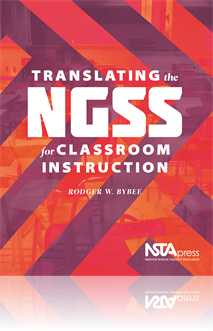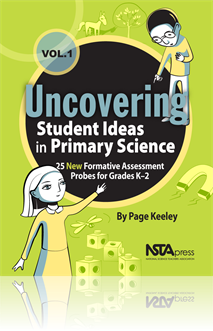All Book Chapters
Book Chapter
This chapter will help state science supervisors, district science coordinators, and school science teachers with the process of adapting instructiona...
Book Chapter
Planning to ADAPT Materials for Classroom Instruction
For this chapter, the goals are to identify the degree to which current instructional materials accommodate performance expectations from Next Generat...
Book Chapter
NGSS Frequently Stated Concerns: The Yes, Buts
In this chapter, some of the Yes, but concerns are addressed. Some of the referents for the concerns lie beyond the Next Generation Science Standards ...
Book Chapter
The Next Generation Science Standards (NGSS) raise the academic bar for states and still leave them with the freedom to adopt or adapt materials and ...
Book Chapter
Appendix A: Grade 5 NGSS Unit, “Is It a New Substance?”
In this unit, students conduct an investigation to determine if two substances combine to form a new substance. The students mix Substance W with a so...
Book Chapter
Appendix B: Middle School NGSS Unit, “Water and Hydrogen Peroxide”
Water molecules and hydrogen peroxide molecules each consist of only hydrogen and oxygen atoms. A water molecule consists of two hydrogen atoms and on...
Book Chapter
Appendix C: High School NGSS Unit, “The Haber-Bosch Process”
A chemist named Fritz Haber developed a process to produce ammonia directly from hydrogen and nitrogen as shown in the equation. An engineer named Kar...
Book Chapter
From NGSS to Classroom Instruction
This chapter provides a context for translating standards into something understandable, manageable, and usable for those with the real task of teachi...
Book Chapter
The purpose of the assessment probe, in this chapter, is to elicit children’s developing ideas about structure in living systems. The probe is desig...
Book Chapter
The purpose of the assessment probe, in this chapter, is to elicit children’s ideas about plants. The probe is designed to find out what characteri...
Book Chapter
The purpose of the assessment probe, in this chapter, is to elicit children’s ideas about needs of living things. The probe is designed to find out...
Book Chapter
The purpose of the assessment probe, in this chapter, is to elicit children’s ideas about sensory responses. The probe is designed to reveal whethe...
Book Chapter
The purpose of the assessment probe, in this chapter, is to elicit children’s ideas about seed germination. The probe is designed to find out if ch...
Book Chapter
The purpose of the assessment probe, in this chapter, is to elicit children’s ideas about floating and sinking. The probe is designed to find out if...
Book Chapter
The purpose of the assessment probe, in this chapter, is to elicit children’s ideas about conservation of matter. The probe is designed to find out...



